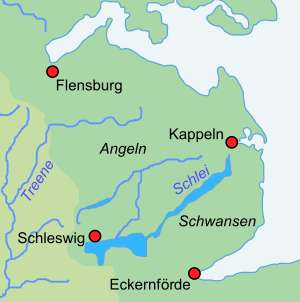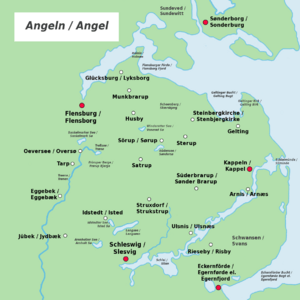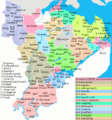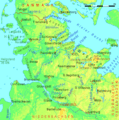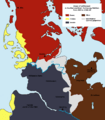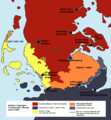Angeln facts for kids
Angeln is a small piece of land in northern Germany. It's a peninsula, which means it's almost surrounded by water. In Danish, it's called Angel. Long ago, it was known as Anglia in Latin.
This small region is very important in history. It's believed to be the original home of a group of people called the Angles. These Angles later traveled across the sea and settled in the southern part of Great Britain. That land was then named after them, becoming England. Because of this, the name of the English language, spoken by millions worldwide, also comes from this little area!
Around the year 350, the Angles left Angeln. Later, by the 8th century, Danish settlers moved into the region.
Where is Angeln?
Angeln is located in a German state called Schleswig-Holstein. It's in the very north of Germany, close to the border with Denmark. The area is known for its green fields and pretty lakes.
Why is Angeln so Important?
Angeln's biggest claim to fame is its connection to the Angles. These people were part of a larger group called the Anglo-Saxons. They played a huge role in shaping early England.
- The Angles were one of the main groups who settled in Britain.
- They gave their name to the country, England.
- They also gave their name to the English language.
So, a small peninsula in Germany had a big impact on history!
Who Lived in Angeln?
After the Angles left, Danish people moved into Angeln. They settled there by the 700s. Over many centuries, the language spoken in Angeln changed. At first, Danish was common. Later, people started speaking Low German. Today, German is the main language.
The largest town in Angeln is Flensburg. It's a busy port city on the Flensburg Firth. Another important town is Schleswig.
See also
Angles Germanic peoples Anglo-Saxons  In Spanish: Angeln para niños
In Spanish: Angeln para niños
Images for kids
-
District of Schleswig-Flensburg (Slesvig-Flensborg)
-
Physical map of Schleswig-Holstein, Anglia (Angeln) in the northeast
-
Lake Südensee (German) or Søndersø (Danish), a glacial lake in Anglia
-
From the 9th to the 11th century, Danish was spoken on the peninsulas of Anglia and Swania (red), the Danish Wahld peninsula was uninhabited (grey), Slavic dialects (Polabian) were spoken on the peninsula of Wagria and on the island of Fehmarn (brown), Old Saxon was spoken south of the River Eider (blue-grey), and North Frisian was spoken in North Frisia (yellow).
-
In the 19th century, a language shift from Danish to Low German occurred in Anglia.
-
Flensburg (Flensborg) is the largest town in Anglia. View of the borough of Jürgensby (Jørgensby) on the Anglian side of the Flensburg Firth.


